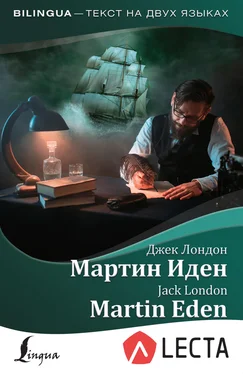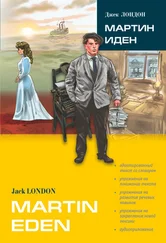“But I have not finished my story,” she said. “He worked, so father says, as no other office boy he ever had. Mr. Butler was always eager to work. He never was late, and he was usually at the office a few minutes before his regular time. And yet he saved his time. Every spare moment was devoted to study. He quickly became a clerk, and he made himself invaluable. Father appreciated him, and he went to law college. He became a lawyer. He is a great man.”
“Yes, he is a great man,” Martin said sincerely.
But it seemed to him that thirty thousand a year was all right, but dyspepsia and inability to be humanly happy robbed the value of this great income.
Martin Eden’s store of money exhausted, and he went to sea. He worked as a sailor for eight months. He earned enough money to stay on land for many weeks, and he did a great deal of studying and reading.
He mastered the grammar and noticed the bad grammar used by his shipmates. He took the dictionary and started to add twenty words a day to his vocabulary. He found that this was not an easy task. He repeated new words in order to accustom his tongue to the language spoken by Ruth.
The captain possessed of a complete Shakespeare, which he never read, and Martin had washed his clothes for him and received the permission to read the precious volumes.
He was touched by the exquisite beauty of the world, and wished that Ruth were there to share it with him. He decided that he would describe to her the South Sea beauty. But soon he understood that he would describe the beauty of the ocean for a wider audience than Ruth. And then came the great idea. He will write! He will write – everything – poetry and prose, fiction and description, and plays like Shakespeare. It is the way to win Ruth. The men of literature were the world’s giants, greater than Mr. Butlers.
To write! This thought was fire in him.
So he entered his old room at Bernard Higginbotham’s and set to work. He did not tell Ruth that he was back. He did not know how long an article he would write, but he counted the words in a article in the SAN FRANCISCO EXAMINER. His writing lasted for three days. Also, he learned that first-class papers paid a minimum of ten dollars a column. So one hundred dollars! and he decided that that was better than seafaring.
He mailed the manuscript in a big envelope, and addressed it to the editor of the SAN FRANCISCO EXAMINER. He had an idea that everything sent to a newspaper was published immediately. Then he decided to write an adventure story for boys and sell it to THE YOUTH’S COMPANION.
He wanted to write about the things he knew. It was easy work, he decided on Saturday evening. He had completed on that day the first instalment of three thousand words.
After breakfast he went on with his story. He often read or re-read a chapter. This was his programme for a week. Each day he did three thousand words, and each evening he studies stories, articles, and poems that editors saw fit to publish. One thing was certain: What these writers did he could do, and only give him time and he would do what they could not do. He was glad to read in BOOK NEWS that Rudyard Kipling received a dollar per word, and that the minimum rate paid by first-class magazines was two cents a word. THE YOUTH’S COMPANION was certainly first class, and at that rate the three thousand words he had written that day would bring him sixty dollars – two months’ wages on the sea!
Конец ознакомительного фрагмента.
Текст предоставлен ООО «ЛитРес».
Прочитайте эту книгу целиком, купив полную легальную версию на ЛитРес.
Безопасно оплатить книгу можно банковской картой Visa, MasterCard, Maestro, со счета мобильного телефона, с платежного терминала, в салоне МТС или Связной, через PayPal, WebMoney, Яндекс.Деньги, QIWI Кошелек, бонусными картами или другим удобным Вам способом.








![Джек Лондон - Мартин Иден [litres]](/books/408564/dzhek-london-martin-iden-litres-thumb.webp)



